
 |
|
Friday Night Lights (2004) Cast: Billy Bob Thornton, Lucas Black, Derek Luke, Garrett Hedlund, Jay Hernandez, Lee Jackson, Lee Thompson Young, Tim McGraw, Grover Coulson, Connie Britton, Kasey Stevens, Ryanne Duzich, Amber Heard, Morgan Farris 2004 – 117 minutes Rated: Reviewed by Dustin Putman, October 8, 2004. 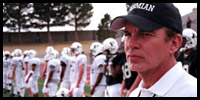 For most sports fans, football is looked at as a simply enjoyable, at times exciting, diversion. For the most die-hard supporters, however, football is a way of life. The people of Odessa—a tiny dust bowl of a town in western Texas—fall into the latter category, with stores closing down early and evidently every resident coming out on Friday nights to see the high school football team face off against a rival. It is almost a religious experience for them, really, perhaps because they live in a place where there is little else to do or feel passionate about. For the players themselves, most of them 17 and facing their senior year of school, winning or losing could mean the difference between getting a scholarship to play college football somewhere and being stuck in the dead-end town forever, their most glorious moments in life long since past. There aren't too many other options beside these.
For most sports fans, football is looked at as a simply enjoyable, at times exciting, diversion. For the most die-hard supporters, however, football is a way of life. The people of Odessa—a tiny dust bowl of a town in western Texas—fall into the latter category, with stores closing down early and evidently every resident coming out on Friday nights to see the high school football team face off against a rival. It is almost a religious experience for them, really, perhaps because they live in a place where there is little else to do or feel passionate about. For the players themselves, most of them 17 and facing their senior year of school, winning or losing could mean the difference between getting a scholarship to play college football somewhere and being stuck in the dead-end town forever, their most glorious moments in life long since past. There aren't too many other options beside these.
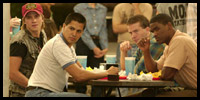 Based on a true story that was documented in the book, "Friday Night Lights: A Town, a Team, and a Dream," by Pulitzer-Prize winning journalist H.G. Bissinger, "Friday Night Lights" treats the game of football and the characters who play it with a gritty seriousness and a spontaneous energy that lifts it above the typical skin-deep sports movies. Seeing it also only puts to shame the recent baseball comedy, "Mr. 3000," which was so lacking in conviction and drive that its very memory had begun to fade before it was even over. In contrast, "Friday Night Lights" crackles and pops with jittery force, so beautifully carried out from a technical standpoint that one hardly notices—at least for a while—the limited depth of the characters and the fact that the picture could have been so much more than it ultimately is. Still, this is a largely appealing drama, the kind of sports movie that anyone, even non-fans of football (like myself), can get wrapped up in and care about.
Based on a true story that was documented in the book, "Friday Night Lights: A Town, a Team, and a Dream," by Pulitzer-Prize winning journalist H.G. Bissinger, "Friday Night Lights" treats the game of football and the characters who play it with a gritty seriousness and a spontaneous energy that lifts it above the typical skin-deep sports movies. Seeing it also only puts to shame the recent baseball comedy, "Mr. 3000," which was so lacking in conviction and drive that its very memory had begun to fade before it was even over. In contrast, "Friday Night Lights" crackles and pops with jittery force, so beautifully carried out from a technical standpoint that one hardly notices—at least for a while—the limited depth of the characters and the fact that the picture could have been so much more than it ultimately is. Still, this is a largely appealing drama, the kind of sports movie that anyone, even non-fans of football (like myself), can get wrapped up in and care about.
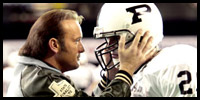 Set during the 1988 football season of Odessa's cherished high school team, the Permian Panthers, director Peter Berg (2003's "The Rundown") focuses his attention on the dogged coach, Gary Gaines (Billy Bob Thornton), and a handful of the players. Coach Gaines places pressure on his charges as a means of building up their self-esteem, even as he befriends some of them and takes a rooting interest in their lives. During the first game of the season, hot-shot quarterback Boobie Miles (Derek Luke) severely hurts his knee, putting him out of the running at doing the one thing he knows he has a future at. Chosen to take Boobie's place at the head of the Panthers is Mike Winchell (Lucas Black), a reserved people-pleaser dealing with some personal issues. Also on view are Don Billingsley (Garrett Hedlund), who can never seem to satisfy his emotionally abusive alcoholic father (Tim McGraw), and Brian Chavez (Jay Hernandez), whose good grades ensure that, out of all his teammates, he is most likely to escape Odessa with or without the state championship win.
Set during the 1988 football season of Odessa's cherished high school team, the Permian Panthers, director Peter Berg (2003's "The Rundown") focuses his attention on the dogged coach, Gary Gaines (Billy Bob Thornton), and a handful of the players. Coach Gaines places pressure on his charges as a means of building up their self-esteem, even as he befriends some of them and takes a rooting interest in their lives. During the first game of the season, hot-shot quarterback Boobie Miles (Derek Luke) severely hurts his knee, putting him out of the running at doing the one thing he knows he has a future at. Chosen to take Boobie's place at the head of the Panthers is Mike Winchell (Lucas Black), a reserved people-pleaser dealing with some personal issues. Also on view are Don Billingsley (Garrett Hedlund), who can never seem to satisfy his emotionally abusive alcoholic father (Tim McGraw), and Brian Chavez (Jay Hernandez), whose good grades ensure that, out of all his teammates, he is most likely to escape Odessa with or without the state championship win.
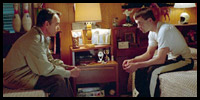 The most accomplished element in "Friday Night Lights" is its raw documentary-like feel, the swarming hand-held camerawork and desaturated colors by cinematographer Tobias A. Schliessler (2000's "Bait") giving the pace a "you-are-there" shot of nervy adrenaline. Were it not for the recognizable actors onscreen and a few unmistakable scripted moments of high drama, the film could pass for being the real thing. "Friday Night Lights" is unsentimental in the best way, garnering an emotional response without reaching for it in obvious ways, and avoiding some of the genre trappings. True, the picture follows a fairly obligatory path, with the untimely injury, the pep talks from the coach, and the climactic big game, but the outcomes of these conventions stray from what is expected.
The most accomplished element in "Friday Night Lights" is its raw documentary-like feel, the swarming hand-held camerawork and desaturated colors by cinematographer Tobias A. Schliessler (2000's "Bait") giving the pace a "you-are-there" shot of nervy adrenaline. Were it not for the recognizable actors onscreen and a few unmistakable scripted moments of high drama, the film could pass for being the real thing. "Friday Night Lights" is unsentimental in the best way, garnering an emotional response without reaching for it in obvious ways, and avoiding some of the genre trappings. True, the picture follows a fairly obligatory path, with the untimely injury, the pep talks from the coach, and the climactic big game, but the outcomes of these conventions stray from what is expected.
 The characters, unfortunately, hold no such scrutiny, their minimal development holding the overall experience back from becoming a classic sports film. The time spent with some of them and their problems—Don enduring his perpetually hurtful father; Boobie and his caring uncle (Grover Coulson) dealing with the knee injury; and Mike coming to terms with who he is and what he wants out of life—is effective from scene to scene, but they don't add up to much in the long run. Writer-director Peter Berg and co-screenwriter David Aaron Cohen are neglectful in deepening the relationships beyond the few scenes each of them are given. Mike appears unhappy throughout, and does things only to please his mother, but his issues are never thoroughly uncovered and remain enigmatic. Brian disappears into the background too often, and there is no sense of what makes him tick. The friendships between the players feel skimmed over, denying the still poignant final scenes of the full impact they deserve. As for Coach Gaines, he is so thinly drawn for so long that the mere fact that he is the father of a preteen daughter isn't discovered until the 90-minute mark.
The characters, unfortunately, hold no such scrutiny, their minimal development holding the overall experience back from becoming a classic sports film. The time spent with some of them and their problems—Don enduring his perpetually hurtful father; Boobie and his caring uncle (Grover Coulson) dealing with the knee injury; and Mike coming to terms with who he is and what he wants out of life—is effective from scene to scene, but they don't add up to much in the long run. Writer-director Peter Berg and co-screenwriter David Aaron Cohen are neglectful in deepening the relationships beyond the few scenes each of them are given. Mike appears unhappy throughout, and does things only to please his mother, but his issues are never thoroughly uncovered and remain enigmatic. Brian disappears into the background too often, and there is no sense of what makes him tick. The friendships between the players feel skimmed over, denying the still poignant final scenes of the full impact they deserve. As for Coach Gaines, he is so thinly drawn for so long that the mere fact that he is the father of a preteen daughter isn't discovered until the 90-minute mark.
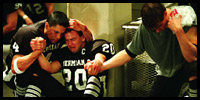 What shades of characterization Coach Gaines does have can be attributed mostly to Billy Bob Thornton's (2003's "Bad Santa") immersive performance. Through him, we sense that his character is one who doesn't look at football with quite the gravity as the rest of the town does, treating his coaching as a job rather than the be-all-end-all of his world. He cares for his players, and wants them to break out of the hopeless small-town existence they are in, but he is just as willing to move away with his family if a game season's loss causes friction between himself and the other townspeople. Thornton invigorates the inspiring locker room talk near the finale with a focused intensity that makes it feel fresh. Out of the players, Lucas Black (2003's "Cold Mountain") is excellent as the earnest Mike Winchell, acting much of the time with his penetrating dark eyes, and Derek Luke (2002's "Antwone Fisher"), while long in the tooth at 29 to be playing a teenager, brings truth and heartbreak to his devastated, ailing Boobie Miles. Finally, in his acting debut, country music singer Tim McGraw is startlingly authentic as a drunkard father who takes out his frustrations and unhappiness on his son.
What shades of characterization Coach Gaines does have can be attributed mostly to Billy Bob Thornton's (2003's "Bad Santa") immersive performance. Through him, we sense that his character is one who doesn't look at football with quite the gravity as the rest of the town does, treating his coaching as a job rather than the be-all-end-all of his world. He cares for his players, and wants them to break out of the hopeless small-town existence they are in, but he is just as willing to move away with his family if a game season's loss causes friction between himself and the other townspeople. Thornton invigorates the inspiring locker room talk near the finale with a focused intensity that makes it feel fresh. Out of the players, Lucas Black (2003's "Cold Mountain") is excellent as the earnest Mike Winchell, acting much of the time with his penetrating dark eyes, and Derek Luke (2002's "Antwone Fisher"), while long in the tooth at 29 to be playing a teenager, brings truth and heartbreak to his devastated, ailing Boobie Miles. Finally, in his acting debut, country music singer Tim McGraw is startlingly authentic as a drunkard father who takes out his frustrations and unhappiness on his son.
 On or off the field, "Friday Night Lights" pulsates with energy and fire, personifying the love many people share for football, as well as the stakes they put into what is, in essence, just a game. It is only in dealing with the town itself, and bringing to life the inhabitants within, where the picture comes up a little short. Because "Friday Night Lights" is carried off with such aplomb, the viewer cannot help but care how things turn out. At the same time, the lack of chemistry between the people—not the actors' faults but the script's—stops the finished product from fulfilling the profundity it is aiming for. What is left is an efficient sports movie, consistently involving and certainly worthwhile, that doesn't quite score an out-and-out touchdown.
On or off the field, "Friday Night Lights" pulsates with energy and fire, personifying the love many people share for football, as well as the stakes they put into what is, in essence, just a game. It is only in dealing with the town itself, and bringing to life the inhabitants within, where the picture comes up a little short. Because "Friday Night Lights" is carried off with such aplomb, the viewer cannot help but care how things turn out. At the same time, the lack of chemistry between the people—not the actors' faults but the script's—stops the finished product from fulfilling the profundity it is aiming for. What is left is an efficient sports movie, consistently involving and certainly worthwhile, that doesn't quite score an out-and-out touchdown.
|
© 2004 by Dustin Putman |














